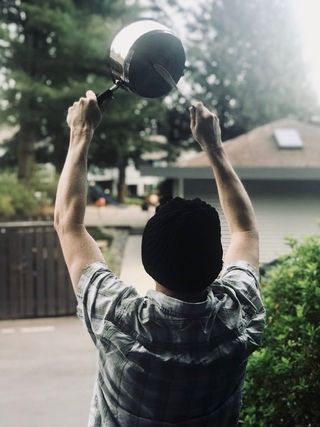Gratitude
The Evening Solidarity Yawp
How the tribute to the frontline workers spread around the world.
Posted May 5, 2020

The first faint plink plink plink is a wake-up call. Time stops having meaning when there’s nowhere you have to be, and after two structureless months of sheltering in place, the whole neighbourhood is in a pre-industrial rhythm now, as if waiting for a rooster to signal the next phase of the day. And there he is! Someone out there is banging on a pot.
Front doors pop open and people emerge. In a world so suddenly devoid of human activity that even the seismographs are flatlining, this is the confirmation we needed that others are alive. The silent jungle telegraph of the internet can't do this job. People need to see and hear each other, even if they can’t yet touch.
And now the rest of us pick up a pot or yogurt tub and join in. It’s not exactly music but it definitely has a beat. And that is key. The pulse of sound made by other people is almost irresistible to the body’s motor system. We want to dance. Or at least move. Falling into rhythm and sculpting a sound together is deeply satisfying.
There’s a guy named Ivan a couple doors down who wears a snare and performs an endless drumroll, as if cranking up the suspense for some cathartic end to this thing. Another gentleman (a soccer fan) toots his vuvuzela. And on the banging goes. Maybe somewhere in here you might ask – although it is by no means compulsory to ask – how did all this start?
Impromptu jams were already happening around the globe by March 23, but a hashtag tweeted out that day focused the beam:
#Solidarityat8
What did it mean? The solidarity part is a shout-out to both the afflicted and the frontline health-care workers bravely tending to them. And 8 because 8 p.m. was the hour when, in Italy, the COVID-19 numbers were released each evening, and citizens responded by belting out songs from their Juliet balconies. The Italians didn’t start the morale-boosting ritual of sounding off every evening – in China, people were chanting upbeat slogans from their windows (“Keep it up, Wuhan!”) within five days of that city’s lockdown on Jan. 23. The Italians merely made it artful. They sang arias and played violins. Amid death and fear, they were saying, there is life and even joy.
But this ought not to be a talent show, the Solidaryat8 movement made clear. You don't even have to be able to carry a tune. Just pick up a kitchen tool and have at it.
Immediately the meme caught, starting in the dense downtown core of cities — where the sonic payoff is immediate and infectious — and quickly spreading.
The Spanish-speaking world is familiar with the stick-and-pot routine. It’s called a casarolazo (literally, "stew pot"), a show of resistance tracing back half a century to when Pinochet cracked down on dissent in Chile. Making a hellacious noise was a way to say: “We will not be silenced.” That’s still what it means: In March, pots rang out in Brazil against the regime of Jair Bolsonaro; in Spain, against the suppression of women’s rights. In Colombia, the casarolazo was repurposed against the new foe, COVID-19, and to rail against inadequate government support during the lockdown. (“We’re hungry!”)
By borrowing this protest tool, people everywhere are performing the ultimate act of transmutation — turning rage into gratitude.
***
Some things are just too large to get your head around. Like the universe. Or the climate emergency. Or this. The ecological philosopher Timothy Morton calls such things “hyperobjects.” We feel helpless in the face of them. But when you’re banging a stick on a pot you’re at least doing something. And so the evening sound-off has become a global reflex that comes up the middle between darkness and light. Shared discontent is not so different from shared fear or shared gratitude, and this is the proof. The evening chorus is “Help!" and "Thanks!” and “Wow!” all in one. In other words, it is a kind of prayer.
This is the paleo internet, folks. We stole it from the wolves.
"People can subscribe any kind of meaning they want to it," one practitioner said of the nightly moon howls that have broken out worldwide now, the next phase of this great global yawp. You try it, you hear a howl in return, and you know that you are covered.
“Fear, like the thought of dying, makes us feel alone,” the Nobel-Prize-winning novelist Orhan Pamuk writes from Istanbul. “But the knowledge that the whole of humanity, from Thailand to New York, shares our anxieties … is a constant reminder that we are not alone.”
That is solidarity.




